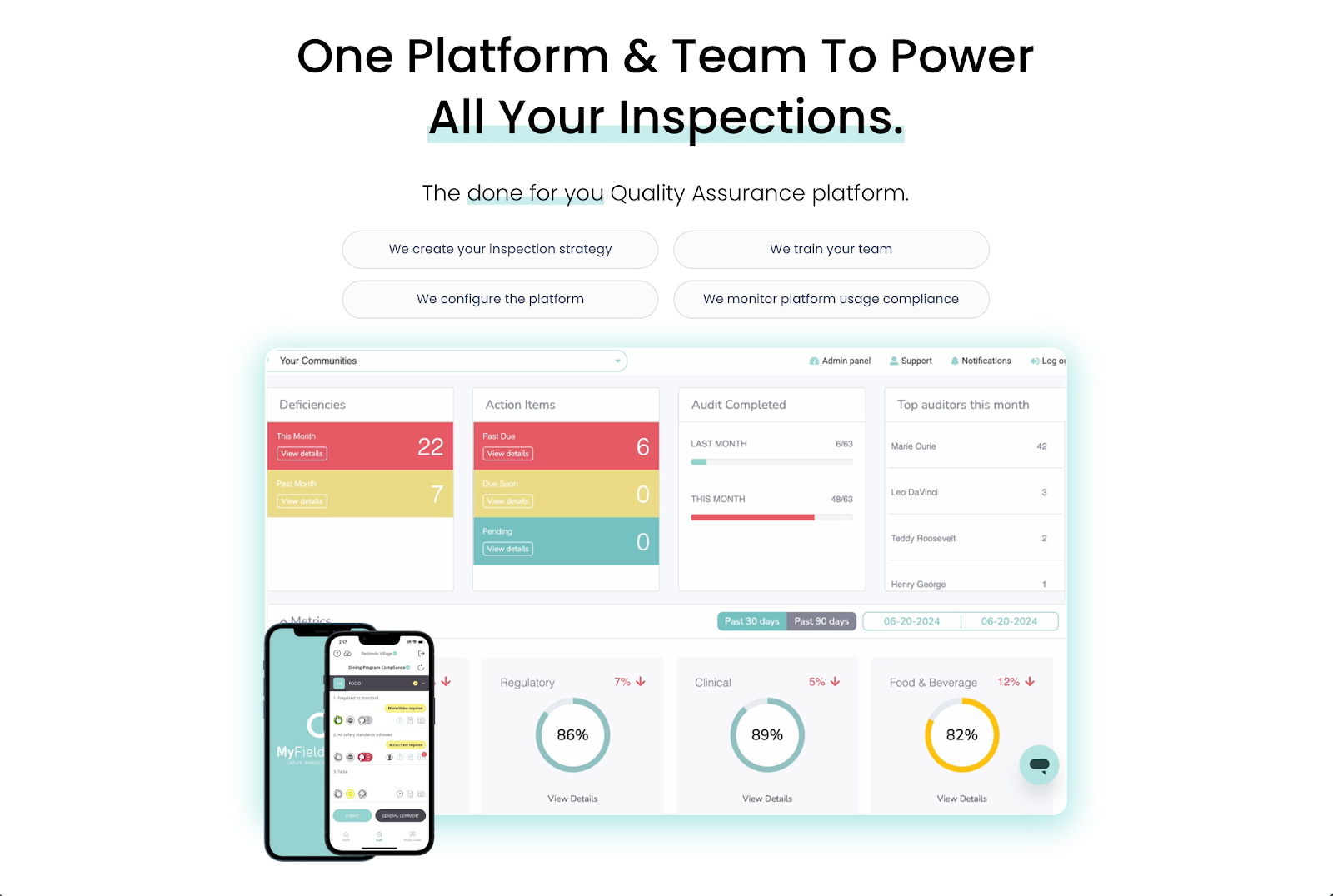.svg)
How to Prepare for FSMA Compliance Audits

Take Control of QA.
Make Inspections Effortless.

We’ll quickly uncover your needs and share how we can help—no pressure, no stress, just solutions. Grab your spot on our calendar today!
Be survey-ready every day with three simple dining audits

We’ll quickly uncover your needs and share how we can help—no pressure, no stress, just solutions. Grab your spot on our calendar today!
Preparing for FSMA compliance audits is among your responsibilities as a food service management company. These regulatory checks directly impact your ability to stay in business, keep clients loyal, and avoid costly disruptions.
Whether you serve assisted living facilities or large corporate accounts, FSMA audits will evaluate how well your business follows food safety regulations. However, knowing what to prepare and where to start often leaves many operators overwhelmed.
In this guide, we will outline the steps to take when preparing for FSMA compliance audits. We will also explain what to expect to help you face auditors with confidence.
Understanding the Food Safety Modernization Act
The Food Safety Modernization Act (FSMA) was signed into law to shift the U.S. food safety system from responding to contamination to preventing it.
Instead of waiting for food safety risks to occur, FSMA focuses on stopping them before they start. This federal food law can prevent serious adverse health consequences and ensure food safety management.
FSMA regulations cover both human and animal food across the supply chain, including contract food services.
Under FSMA rules, businesses operating in the food industry should implement risk-based preventive controls and conduct hazard analysis. These help maintain regulatory compliance and protect public health.
What to Expect During an FSMA Compliance Audit
Prepare for a detailed review of your entire operation, from how you receive food products to how you store, produce, and serve them.
Qualified auditors from the Food and Drug Administration (FDA) will check if your facility takes the appropriate measures to meet current food safety standards and prevent food contamination. They will observe your operations and interview staff to see if they are properly trained in ensuring food safety.
FSMA audits can be scheduled or unannounced, and they may vary depending on your business model. Some inspections are routine, while others are triggered by complaints, previous violations, or random selection.
Regardless of the type or occurrence of the FSMA audit, the purpose remains the same. It makes sure your food facility can manage animal and human food safely.
Failure to comply can lead to costly penalties, forced product recalls for food manufacturers, or even temporary suspension of operations. All of these can damage client trust and disrupt business.

How to Prepare for FSMA Compliance Audits: A Step-By-Step Guide
Now that you know what to expect, here’s how to prepare for an FSMA audit with confidence.
1. Review Your Facility's Food Safety Plan
Start by examining whether your food safety plan still aligns with FDA regulatory requirements and FSMA rules.
Conduct internal audits to identify food vulnerabilities within your processes, from receiving ingredients to serving finished meals. What are your food safety risks? Are your preventive controls still relevant to ensure compliance?
When you know where your current food safety standing is, you can develop a stronger plan that can easily pass regulatory audits.
2. Create an FSMA Compliance Checklist
After reviewing your food safety plan, the next step is to break it down into an actionable checklist. This helps your team stay on track and organized during on-site audits and field inspections.
A well-structured checklist should reflect your specific process flow, meet regulatory obligations, and address weak points in your food supply chain.
Below are some of the most important categories your compliance audit checklist should cover:
Hazard Analysis
Your FSMA checklist should begin with determining risks through a detailed hazard analysis. This means identifying potential biological, chemical, and physical hazards at each stage of your operation, from receiving ingredients to final food service.
You should have a corresponding control measure for every identified hazard. Then, regularly review the effectiveness of these controls through HACCP audits.
Produce Safety
If you handle fresh produce or work with the produce industry, include a section that focuses on proper washing, storage, and cross-contamination prevention. Conduct water quality testing and maintain proper temperature controls to avoid food safety hazards.
FSMA rules around produce are specific and strict, so your checklist should reflect those food safety requirements closely.
Sanitary Transportation
Whether you operate your own fleet or rely on vendors to transport food, you should document sanitary measures.
Check for vehicle cleanliness, cargo separation, refrigeration performance, and cleaning logs. These help prove compliance efforts when the FDA conducts food safety audits.
Preventive Controls
List every preventive control you’ve implemented to stop food hazards before they occur. This includes temperature logs, allergen management, cleaning schedules, and pest control procedures. Each control should be linked to a documented policy or standard operating procedure.
Monitoring Procedures
Lastly, confirm that monitoring procedures are active and consistent. This means verifying that logs are updated in real time, employees know what to document, and supervisors review those records.
Auditors will often ask to see this documentation during on-site audits, so it should be easy to access and complete.
3. Assign Clear Roles and Responsibilities
This step is often overlooked during the FSMA audit preparation. However, every team member involved in food handling should understand their specific duties related to the safety plan implementation.
That is why it's important to assign defined roles to reduce confusion during inspections and minimize hazards in daily operations. This includes who logs temperature data, who verifies cleaning records, and who oversees required food safety certification.
Appoint a compliance leader who will act as the main contact during private audits or FDA inspections. This person should understand your food safety plan inside and out. They’ll make sure audits go smoothly and that any requests from auditors are handled quickly.
4. Train Staff on Your FSMA Compliance Strategy
Clear roles and responsibilities are important, but it is effective training that helps your staff prepare for FSMA audits.
Make sure each employee knows how to follow food safety procedures, complete records, and assess potential hazards during daily tasks.
You can start with hygiene training for all food handlers, then expand into specific job duties, such as allergen control or temperature monitoring.
Go beyond basic instructions. Teach your team why these steps matter and how they play a big role in FSMA audits.
For those in supervisory roles, provide deeper training that covers verification activities and the technical expertise needed to validate your food safety processes.
5. Verify Your Supply Chain Partners
Under the Food Safety Monitoring Act, supplier verification is a key part of regulatory compliance. You should confirm that all vendor partners, especially those providing food imported from foreign facilities, follow proper safety practices.
If you work with international vendors, the Foreign Supplier Verification Program (FSVP) outlines how to assess risk and document compliance.
Some food industry operators may choose to participate in the voluntary qualified importer program. This is a voluntary program that offers faster entry of goods but demands stricter recordkeeping. It's important to document supplier audits, certifications, and food testing results for compliance.
6. Develop a Corrective Action Response Plan
Mistakes happen even in well-managed food facilities. What matters most is how you respond.
A corrective action response plan outlines exactly what your team should do when a food safety issue is identified, whether during internal checks or third-party audits.
This plan should include steps for identifying the root cause, correcting the problem, and preventing it from happening again.
Make sure each type of issue, such as temperature violations, cross-contamination, or missing records, has a documented response procedure.
The FDA looks for written evidence that you don’t just catch problems but take steps to fix them quickly and effectively.
7. Automate Manual Tasks
Manually tracking audit activities is time-consuming and prone to errors. Consider automation to make FSMA tasks easier to manage and harder to overlook.
Use food safety management software to schedule routine checks, send alerts for identified hazards, and generate real-time reports for audits.
You can also track temperature logs, sanitation schedules, staff training, and supplier documentation through the software.
This can eliminate paperwork, improve real-time visibility across all sites, and keep your team focused on running a safe, compliant business.
8. Partner With an Accredited Third-Party Certification Body
You can work with an accredited third-party certification body to further strengthen your FSMA compliance.
These organizations conduct private audits that closely mirror FDA inspections, helping you find and fix issues before regulators arrive. Third-party audits are especially helpful for verifying that your food safety plan, documentation, and staff procedures meet current FSMA standards.
Choose an accredited certification body with experience in food service operations and a strong track record in regulatory compliance. Their guidance can give your team confidence. They also show clients and FDA auditors that you take food safety seriously.
Achieve FSMA Compliance With MyFieldAudits
MyFieldAudits helps food service management companies and assisted living communities navigate FSMA audits with confidence.
Our mobile-friendly audit inspection app puts real-time visibility, accountability, and performance tracking directly in the hands of your operations teams.
You can conduct on-site inspections, identify food safety hazards, and implement corrective actions from anywhere. You can even generate shareable reports that help prove your value to clients across multiple locations.

What sets MyFieldAudits apart is its commitment to enterprise support. We don’t just provide software tools.
We also help you manage the entire lifecycle of on-site inspections, so you can maintain standards and keep clients loyal without lifting a spreadsheet.
Schedule a discovery call today to get started! You can also watch this product overview to learn more about MyFieldAudits.
FAQs About FSMA Compliance Audits
What are the 7 rules for FSMA compliance?
FSMA compliance audits follow these seven rules: preventive controls for human and animal food, produce safety, foreign supplier verification program, sanitary transportation, accredited third-party certification, food traceability, and mitigation strategies against intentional adulteration.
What are the five key elements of FSMA?
FSMA is built on five pillars: preventive controls, inspections and compliance, imported food safety, response, and enhanced partnerships.
These elements align with the Global Food Safety Initiative (GSFI) principles, which set the standard for both domestic and international food safety practices.
How to comply with FSMA?
To achieve FSMA compliance, you need a food safety plan that covers hazard analysis, risk assessment, preventive controls, and monitoring procedures. You should also develop a corrective action response plan, maintain accurate records, follow FDA compliance dates, and conduct routine audits.
What does FSMA stand for?
FSMA is short for the Food Safety Modernization Act. It is considered an upgrade to the previous Federal Food, Drug, and Cosmetic Act (FD&C Act). FSMA gives the FDA stronger authority, including mandatory recalls and preventive controls, to make food safety proactive instead of reactive.
%201.svg)






%201%20(1).svg)